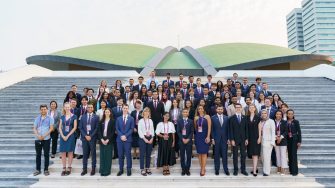Engineering Policy at the Youth G20 Summit
Engineering and policy making are rarely framed as congruent, but my experience at the Y20 has shown me that the opposite is true.
Engineering and policy making are rarely framed as congruent, but my experience at the Y20 has shown me that the opposite is true.

Nearing the end of Term 2, when many students are buried deep in assessments after spending flex week a bit too flexibly, I jetted off to Indonesia to attend the Youth G20 Summit. This summit represented the culmination of months of work in my role as one of four Australian delegates to the Youth G20 (Y20). The Y20 is the official youth engagement body of the G20, a forum that fosters economic cooperation amongst the world’s major economies. The aim of the summit was to agree upon proposal for G20 Leaders in areas such as sustainability, youth employment and digital transformation.
So, what was a fifth-year chemical engineering student (albeit one doing a double degree with arts) doing at a summit tasked with developing policy proposals for the leaders of the world’s major economies? When I applied for the opportunity back in January, I asked myself a similar question. In fact, I almost didn’t apply as I was worried that my engineering background would make me irrelevant in the land of diplomacy, policy, and international relations. Much to my surprise, my engineering degree and experiences in industry turned out to be a real asset.
This dynamic was particularly apparent during the policy drafting process. I was able to recognise the technical challenges associated with decarbonising the production of goods and service thanks to my final year design project and honours thesis. I introduced several policy proposals aiming to accelerate industrial decarbonisation, an oft-overlooked element of the transition to net-zero. Similarly, understanding the strong overlaps between social and environmental issues thanks to my humanitarian engineering courses and experience working in NSW’s safety regulator, I advocated strongly for proposals which fostered not only environmental but also social sustainability.
My engineering degree also set me up well for the practical side of things. My main task in the lead-up to the forum was to work alongside the delegates from the other G20 member states to draft two pages of policy proposals addressing pressing environmental challenges. Sounds cool - and it was. In practice this meant a whole lot of research, late night meetings and tracking progress to ensure that we developed, decided upon, and delivered policy proposals before the summit. Again, my engineering experience came in handy, with the years of research reports, group assessments and late-night assignment grinds (we’ve all been there!) providing a great foundation.
Engineering and policy making are rarely framed as congruent, but my experience at the Y20 has shown me that the opposite is true, and that engineers can (and should!) play a valuable role in developing policies to address environmental, social and economic challenges.